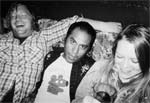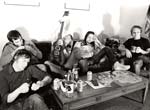| |


I Wish My Brother George Was Here
$11.99 CD




No Need for Alarm
$11.99 CD


|
|
DEL THA FUNKY HOMOSAPIEN
I Wish My Brother George Was Here
(Elektra)
 |
"Mistadobalina" |
DEL THA FUNKY HOMOSAPIEN
No Need for Alarm
(Elektra)
 |
"Catch a Bad One" |
Could this man be one of the most influential emcees ever? Well,
I don't know if Del has achieved the kind of Zen-like reverence
that artists like Rakim, B.I.G. and Tupac have, but I can't think
of a more underrated artist who has had such a major impact on
the current indie-underground hip-hop aesthetic, especially on
the West Coast. The irony being, of course, that these two albums
were considered commercial failures by the label. But the legacy
of these recordings continues to grow, with emcees like Eminem,
Bun B and Murs all citing these records as a major influence.
Hell, even Dave Chappelle claims that he is a huge Del fan!
Del is Ice Cube's cousin and Cube signed him to his burgeoning
production/management company, Street Knowledge, which boasted
a roster of intimidating sounding West Coast gangsta rap groups
like Da Lench Mob and WC & the Maad Circle. But one look at
Del's album cover, which featured a pensive and slightly paranoid
looking Del sitting in a forest with a sea of human eyeballs staring
at him, you got the feeling that this wasn't going to be your
typical gun totin', crack slangin' affair. But whatever nervousness
he felt about all eyes being on him must have dissipated in the
studio, because this vicious debut, I Wish My Brother George
Was Here, featured a self-assured Del attacking the mic with
a direct, taunting yet disarmingly sing-songy flow that sounded
like nothing else at the time. His underlying theme throughout
the album is about staying true to one's self at all times, and
the trials and tribulations of doing that when you're a young,
eccentric, black male survivin' in the hood. The subjects he rhymed
about included getting harassed by gang members on the bus for
dressing funny ("Wacky World of Rapid Transit"), pretty-boy
emcees who dance ("Pissin' on Your Steps"), skin tone
issues among blacks ("Dark Skin Girls"), and lazy friends
who sponge ("Sleepin' on My Couch"). It wasn't anything
that other rap artists weren't doing at the time, but the way
Del used his cynical observational sense of humor to channel that
frustration into his rhymes was an absolutely groundbreaking formula
-- a formula Eminem took straight to the bank six years later.
The beats were great too...okay, hampered only by the West Coast
g-funk overtones that were the rage at the time. At its best,
it's a chunky, layered sound that flips the Parliament and Zapp-like
grooves on its ear and injects a jazz element to the proceedings,
which Del and co. would expand upon on No Need for Alarm.
I guess you could say that Alarm is kind of like Del's
Sister Lovers or Pink Moon, an album that by all
means should fail considering the artist's mind-state at the time;
but the pure honesty of the emotions coupled with his incredible
talent give the album a weird, self-destructive focus that still
inspires to this day. The honesty contained within these recordings
was a welcome breath of fresh air. He introduced a new, distinct
brand of West Coast hip-hop culture that was decidedly different
than the Afro-centric, slightly gimmicky style of leftfield hip-hop
coming out of the East Coast -- a style where flow reigned supreme
and individualism was king. Around this time, he split from the
Street Knowledge crew and label, solidified his own crew of oddball
emcees, the Hieroglyphics, and recorded this mainly self-produced
album. Gone was the bright roller funk thump of George,
which was replaced with an inverted spaced-out jazz sound that
sounds pretty close to the classic East Coast boom-bap. Only Del
took out the bap and left only the boom, keeping the sound as
sparse and minimal as possible. The space was filled with his
vitriolic rhymes aimed at music critics, shady record execs, and
wack emcees. It boasted no bouncy hooks or choruses, just pure
lyrical heat meant to be a wake-up call to all bandwagoning rappers
to stay original, and a f**k you aimed at the music industry execs
attempting to market him and hip-hop as pop entertainment. The
album boasted no videos or real singles, so it sank pretty quickly.
But over the years, this record has been an enormous impact on
the West Coast underground, paving the way for the sound and subsequent
success of artists like Madlib, Freestyle Fellowship and Del's
own Hieroglyphics crew.
Del went on to have subsequent success with the Gorillaz and his
other solo works, but always on his own terms and never compromised.
His unsung influence started with these two albums, so if you
consider yourselves a fan of any of the aforementioned artists
and aren't familiar, consider these essential listening! [DH]
|
|
























